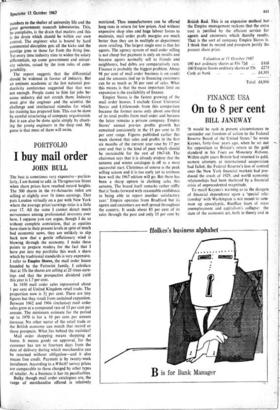I buy mail order
PORTFOLIO JOHN BULL
The best is sometimes very expensive—particu- larly, I am bound to add, in Throgmorton Street when share prices have reached record heights. The 500 shares in the Fr-Actuaries index are selling at slightly over 16 times earnings. That puts London virtually on a par with New York where the average price/earnings ratio is a little over 17. All the same I cannot detect much nervousness among professional investors over here. I suppose you can argue, though I do so without complete conviction, that as equities have risen to their present levels in spite of much bad economic news, they are unlikely to slip back now that a gentle reflationary wind is blowing through the economy. I make these points to prepare readers for the fact that I have put into my portfolio this week a share which by traditional standards is very expensive. I refer to Empire Stores, the mail order house founded by the Fattorini family. I calculate that at 55s the shares are selling at 25 times earn- ings and that the prospective dividend yield this year is 1.7 per cent.
In 1950 mail order sales represented about 1 per cent of United Kingdom retail trade. The proportion now is 34 per cent. These are tiny figures but they result from sustained expansion. Between 1962 and 1966 (inclusive) mail order sales grew at a compound rate of 13 per cent per annuth. The minimum estimate for the period up to 1970 is for a 10 per cent per annum increase. No other sector of the retail trade or the British economy can match that record or those prospects. What lies behind the statistics?
Mail order shopping means shopping at home. It means goods on approval, for the customer has ten to fourteen days from the date of delivery during which merchandise can be returned without obligation—and it also means free credit. Payment is by twenty-week instalment. According to a Which? survey prices are comparable to those charged by other types of retailer. As a business it has its peculiarities.
Bulky though mail order catalogues are, the range of merchandise offered is relatively restricted. Thus manufacturers can be offered long runs in return for low prices. And without expensive shop sites and huge labour forces to maintain, mail order profit margins are much better than they are in multiple or department store retailing. The largest single cost is that for agents. The agency system of mail order selling is not cheap but payment is only on results and because agents normally sell to friends and neighbours, bad debts are comparatively rare. Finance is probably the biggest problem. About 98 per cent of mail order business is on credit and the amounts fled up in financing customers can be as much as 30 per cent of sales. What this means is that the most important limit on expansion is the availability of finance.
Empire Stores is the fastest growing of the mail order houses. I exclude Great Universal Stores and Littlewoods from this comparison because the former earns only about one-third of its total profits from mail order and because the latter remains a private company. Empire Stores' annual pre-tax profits growth has remained consistently in the 15 per cent to 35 per cent range. Figures published earlier this week showed that sales and profits in the first six months of the current year rose by 17 per cent and that is the kind of pace which should be sustainable for the rest of 1967-68. The chairman says that it is already evident that the autumn and winter catalogue is off to a most successful start: Christmas of course is the peak selling season and it is too early yet to estimate how well the 1967 edition will go. But there has been a sharp upturn in clothing sales this autumn. The board itself remarks rather stiffly that it 'looks forward with reasonable confidence to being able to report another satisfactory year.' Empire operates from Bradford but its agents and customers are well spread throughout the country. It sends about 85 per cent of its sales through the post and only 15 per cent by
British Rail. This is an expensive method bus the Empire management reckons that the extra cost is justified by the efficient service for agents and customers which thereby results. That is the sort of company Empire Stores is. I think that its record and prospects justify the present share price.
Valuation at 11 October 1967 100 RAT ordinary shares at 83s 71d .. 100 Empire Stores ordinary shares at 55s Cash at bank .. Total £4,998 £418 £275 £4,305


































 Previous page
Previous page